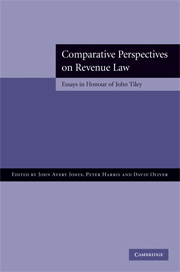Book contents
- Frontmatter
- Contents
- Contributors and affiliations
- Foreword by Dave Hartnett
- Foreword by Hugh Ault
- 1 A comparison of statutory general anti-avoidance rules and judicial general anti-avoidance doctrines as a means of controlling tax avoidance: Which is better? (What would John Tiley think?)
- 2 The judicial approach to avoidance: some reflections on BMBF and SPI
- 3 Comparing the application of judicial interpretative doctrines to revenue statutes on opposite sides of the pond
- 4 Abuse of rights and European tax law
- 5 The US legislative and regulatory approach to tax avoidance
- 6 The law of taxation and unjust enrichment
- 7 The history of royalties in tax treaties 1921–61: Why?
- 8 Land taxation, economy and society in Britain and its colonies
- 9 Meade and inheritance tax
- 10 Taxation, human rights and the family
- 11 Family connections and the corporate entity: income splitting through the family company
- Epilogue: Establishing the foundations of tax law in UK universities
- References
- Table of cases
- Table of abbreviations
- Index
Foreword by Hugh Ault
Published online by Cambridge University Press: 07 December 2009
- Frontmatter
- Contents
- Contributors and affiliations
- Foreword by Dave Hartnett
- Foreword by Hugh Ault
- 1 A comparison of statutory general anti-avoidance rules and judicial general anti-avoidance doctrines as a means of controlling tax avoidance: Which is better? (What would John Tiley think?)
- 2 The judicial approach to avoidance: some reflections on BMBF and SPI
- 3 Comparing the application of judicial interpretative doctrines to revenue statutes on opposite sides of the pond
- 4 Abuse of rights and European tax law
- 5 The US legislative and regulatory approach to tax avoidance
- 6 The law of taxation and unjust enrichment
- 7 The history of royalties in tax treaties 1921–61: Why?
- 8 Land taxation, economy and society in Britain and its colonies
- 9 Meade and inheritance tax
- 10 Taxation, human rights and the family
- 11 Family connections and the corporate entity: income splitting through the family company
- Epilogue: Establishing the foundations of tax law in UK universities
- References
- Table of cases
- Table of abbreviations
- Index
Summary
I was pleased and honoured to be asked to write a foreword to this collection of essays in honour of John Tiley, an old friend and respected colleague. Both the substance of the contributions in the collection and the status of the authors show the esteem in which the international tax community holds John.
It is appropriate that the title of the collection involves comparative perspectives on revenue law, as John's scholarship and academic activities were centred on comparative interests. He has been a visiting scholar at many foreign institutions, particularly in the US and France, and that experience gave a depth and substance to his comparative writing. In the other direction, he was the point of reference for all comparative work which deals with UK law. He was a welcoming host to many visiting scholars who made Cambridge a necessary stopping point in their scholarly travels. (And further he endeared himself to his international colleagues by writing a very useful essay on the double tax problems faced by travelling academics.)
John brought a unique style and approach to writing about tax law. As Brian Arnold puts it in the culinary metaphor with which he introduces his contribution to this collection, John Tiley is a ‘master chef’ when it comes to tax law scholarship. His offerings are many and varied and always have a special flavour.
- Type
- Chapter
- Information
- Comparative Perspectives on Revenue LawEssays in Honour of John Tiley, pp. xvi - xviiiPublisher: Cambridge University PressPrint publication year: 2008
- 2
- Cited by

